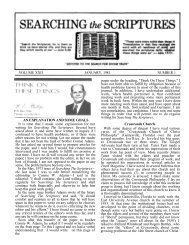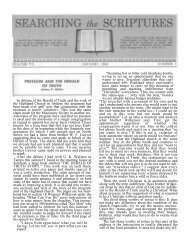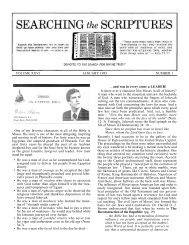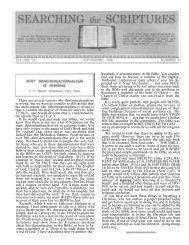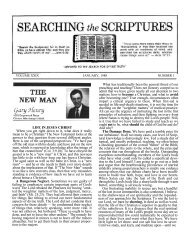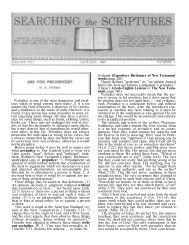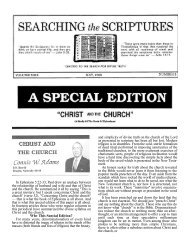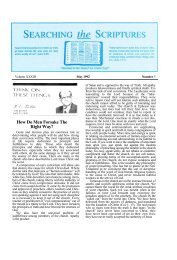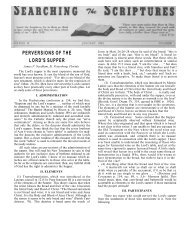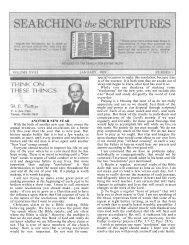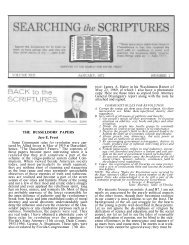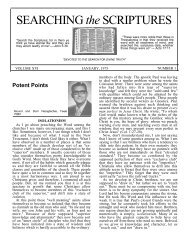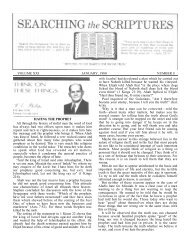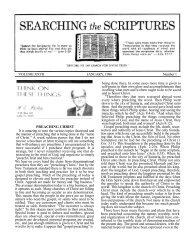Volume 31 – 1990 (PDF) - Searching The Scriptures
Volume 31 – 1990 (PDF) - Searching The Scriptures
Volume 31 – 1990 (PDF) - Searching The Scriptures
You also want an ePaper? Increase the reach of your titles
YUMPU automatically turns print PDFs into web optimized ePapers that Google loves.
Page 10<br />
will leave us with too few friends with whom to have pot<br />
luck.<br />
I agree that he did not say there is no one with whom<br />
he agrees fully on the question of marriage and divorce.<br />
He said he is not sure such a man lives. If it helps us get<br />
closer together, just strike that sentence of mine out. I<br />
retract it. It is a very small thing to dissect a sentence<br />
from "I am not sure there is a man anywhere with whom<br />
I agree, " and there is no man with whom I agree. I stand<br />
corrected.<br />
One thing that is extremely comforting to me is his<br />
agreement with the basic principles I attributed to<br />
Connie Adams. But Ken, if that old saying of "sauce for<br />
the... " still works, why did you even mention the<br />
catechism you are certain that all of us are certain does<br />
not exist? Were you concerned that someone might think<br />
the catechism exists, even unofficially? We can put that<br />
in the "careless" reporting sack or something very close<br />
to it.<br />
Brother Green agrees with the scriptural principles<br />
in reference to those who clearly have a divine grant for<br />
marriage. But we do not fully agree. Ken again leaves<br />
what is plainly revealed on an excursion into the "if<br />
land. <strong>The</strong> "if is whether Ken and I can agree with<br />
Connie Adams in regard to the second point. I will not<br />
even attempt to speak for brother Adams. He has been<br />
doing that quite well for years without my help. But<br />
permit me to simply observe that any modification<br />
anyone puts on a given situation must be based on what<br />
is plainly revealed — not on some supposed or even real<br />
situation. I perceive this to be Ken's problem on this<br />
point.<br />
Ken wonders out loud in regard to Connie's consistency<br />
regarding an innocent party's right in a divorce to<br />
remarry in a case where fornication is involved. <strong>The</strong> case<br />
involves the innocent party's initiating the action, as<br />
Ken sees Connie's position. This entire portion of his<br />
article smacks of pitting one against another who both<br />
concluded there is danger in what Ken wrote. I believe<br />
that not only brother Adams, but a number of other<br />
readers, perceived that danger.<br />
<strong>The</strong> question of fellowship recurs in Ken's articles. In<br />
theory, Christians are in fellowship (if ever so loosely)<br />
with other Christians, meaning they have a common<br />
family connection. In practice, jointly participating with<br />
the brethren, the same Christians have very little fellowship<br />
with others outside their local activities. What<br />
fellowship have brother Green and I ever had? What<br />
joint work have we engaged in as brethren in fellowship?<br />
This encounter is one of the few associations we ever<br />
have had. We should quit trying to decide the fellowship<br />
question before we get the problem fully studied.<br />
My point on baptism was not even remotely designed<br />
to deal with how we treat a brother who wants to be<br />
baptized in a running stream. Ken, it had to do with<br />
understanding the plainly revealed facts concerning<br />
baptism and abiding within the divine standard even in<br />
the presence of questions we may not be able to answer.<br />
We may not be able to answer all the questions someone<br />
can pose regarding various aspects of baptism, but we<br />
can recognize scriptural baptism. I could not get from<br />
your article that you believe such is the case in marriage<br />
and divorce. If you do recognize a scriptural marriage, a<br />
second marriage God authorizes, it would be very enlightening<br />
(at least to me) to know how you recognize it.<br />
<strong>The</strong> war question is not handled in scripture like<br />
adultery. <strong>The</strong> two issues are not in the same class. In the<br />
"war question" it is their obligation. I cannot blackball a<br />
brother who believes participation in governmental<br />
affairs is murder. I can try to teach him. But in adultery,<br />
where I am presented with the facts of an illegitimate<br />
marriage, and understand the Lord's will as I do, I would<br />
be in the position of the pacifist. But, Ken, I would be<br />
right (and you agree) if I stand on the three premises<br />
listed earlier. Adultery makes a union of male and<br />
female corrupt. Participation in governmental affairs is<br />
not sinful. Murder is wrong. Adultery is wrong. But<br />
participation in governmental affairs is not murder.<br />
This is a case of keeping apples with apples and oranges<br />
with oranges.<br />
I wish the scope of our discussion could permit a full<br />
analysis of Romans 14, but Ken says it doesn't. <strong>The</strong><br />
statement, "there can be no wrong position to take on<br />
anything over which good men of spiritual wisdom and<br />
unblemished reputation differ" was mine, Ken. I am<br />
putting it on you as a consequence of your application of<br />
Romans 14. If it is erroneous to say "both sides were<br />
right" in the things over which they were divided in<br />
Romans 14, which was the wrong party? Why did Paul<br />
say in verse three that both the one who would eat and<br />
the one who would not were both received by God? Did<br />
God receive someone who was wrong on an issue that<br />
parallels adultery? If your application of it to divorce is<br />
valid, does God accept some who are in an adulterous relationship?<br />
Brother Green did the very thing Paul repeatedly<br />
says no man has a right to do. He rendered a<br />
judgment on someone in Romans 14 and Paul forbade<br />
such (Verses 4, 10, and 13). Paul even prohibited trying<br />
to change the other's scruples (verse 1).<br />
Ken's reference to the brethren who have written him<br />
saying they would not fellowship anyone with whom<br />
they disagree on the war issue, the covering, or divorce<br />
proves very little to me. It has about as much weight as<br />
the many letters and calls I received as a result of my<br />
written response, without exception expressing the<br />
same fears of which I wrote. In the final analysis, it is a<br />
love of revealed truth, a respect for individual differences<br />
in unrevealed matters, and brotherly concern for<br />
each other that will help us strike hands in unity and<br />
fellowship as God would have it. <strong>The</strong>re is nothing at all<br />
wrong with vigorous discussion of differences of any<br />
kind, such as those Ken mentioned in the last paragraph,<br />
but I still deeply feel that there is a great danger<br />
in any effort to reduce the seriousness of something as<br />
clearly condemned in scripture as the adulterous and<br />
sinful results of divorce and remarriage with no scriptural<br />
grounds. To make it appear that it is no more<br />
serious than the covering question or the war question<br />
was a mistake.<br />
I appreciate the opportunity this paper has offered to<br />
have this problem heard. I sincerely hope there will be no<br />
biting and devouring among us. I still admire brother



